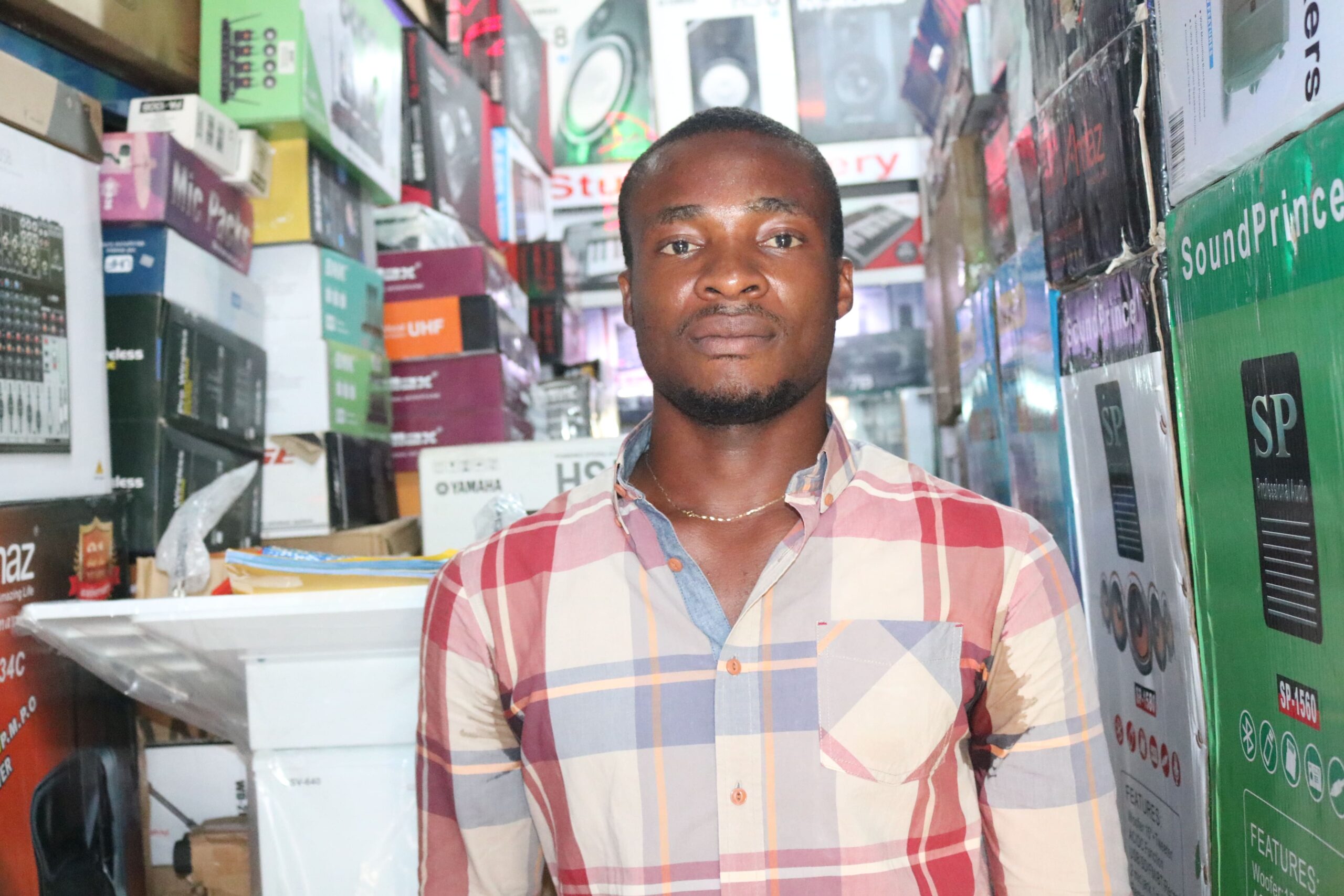LAGOS: When Nonso Echeta finished secondary school in 2011, he really wanted to go to the university to study law.
“What I wanted to study was law, he said.
However, that dream never came true because his family had no money to send him to the university.
In late 2011, then 18, he was sent to live with his mother’s cousin, Ekene Nweke, who owned a large shop in Nigeria’s capital city, Abuja, where he sold different musical instruments like keyboard, guitar, microphone, and others.
That was how Echeta became an “apprentice” to Nweke, under the mutual agreement that he would live with Nweke for seven years, serving him as a sales boy without monthly payment.
In exchange, Nweke would teach him all he needed to know about the trade. And when he concludes his years of service, Nweke would “settle” him, meaning to give him a start-up capital just enough to help him set up a small shop and begin his independent entrepreneurial journey in the same line of merchandise.
Today, two years after completing his service to Nweke, Echeta owns a shop at Intercontinental Plaza in Wuse Zone 3, Abuja. The goods in his shop are worth over N30 million or $73,000, he said. That represents a 30-fold growth, having received just N1million or $2,439 from Nweke.
“I was 18 when I started serving my master [and when he settled me] I started by buying [musical instruments] one, two, three, and so on,” said Echeta, who is 28 now.
“My survival [and growth] is my customers. They walk in, they buy. If it serves them, they give referrals. We have been growing, and we make sure to satisfy our customers.”
Early last year, when Echeta’s business started showing signs of growth, he travelled back to Nise, his hometown in Awka South Local Government Area of Anambra State, and picked a 20-year-old boy to serve him under an arrangement similar to the one he had served Nweke.
Nweke himself was a product of the apprentice-to-master system now known as the “Igbo apprenticeship system” or Imu-Ahia in the Igbo language. It is a communal system invented, developed, practiced, and sustained by traders of Nigeria’s Igbo, one of the country’s major ethnic groups occupying southeastern Nigeria with an estimated population between 22 and 40 million and spread across Enugu, Anambra, Abia, Imo, and Ebonyi states.
The model has produced many entrepreneurs, including billionaires like Cletus Ibeto, founder of Ibeto Group, a corporation with interests in ICT, petrochemicals, and hospitality; and Innocent Chukwuma, the founder of Nigeria’s first automobile assembling and manufacturing plant.
In a nutshell: it is about successful people in business picking up either younger family members or non-relatives – mostly primary and secondary school leavers – to serve them and later set them up in business in return.
How much an apprentice is settled with could be based mainly on how generous the master is and how loyal, committed, and productive the apprentice was.
“The heart of the system depends mainly on who you are, both master and apprentice,” said Maduabuchi Adiukwu, a former apprentice who now owns a multi-million naira electronics shop at Alaba International Market in Nigeria’s commercial city of Lagos. “If the master is a good person, he treats his apprentice like a brother, and you will flourish.”
But Echeta says what is most valuable to an apprentice is not the start-up capital but the built experience, networks, and collaborations that one could leverage for growth after he is settled.
“It’s the knowledge that is imparted while you are serving. If you talk of money, the money [I was given] was nothing to start life with,” he said. “The knowledge was the key idea that I got from him. Knowledge…about how you sell and buy, the places to buy the products to give to your customers, and how you set your target customer.”
Rooted in culture
It is common for newly inducted entrepreneurs to travel away from their immediate environments to discover and take advantage of new markets, leading to Igbos penetrating and dominating trade in major markets across Nigeria.
For example, known as the largest electronic market in West Africa, Alaba International Market, with its 10,000 merchants who generate over $4billion every year, is 52.8% dominated by Igbo traders despite being located in the southwest, home to the Yoruba ethnic group.
“I can say with almost certainty that the Igbo apprenticeship system that governs Alaba International Market is the largest business incubator platform in the world,” said Robert Neuwirth, an American journalist and author who investigates street markets.
However, researchers say the people’s local traditions and past bitter experiences have been the most significant drivers and sustaining power of the system that has placed the Igbos in an advantaged position against other regions.
Pre-colonial and colonial Igbos, for instance, operated a decentralised political system called “village democracy.” The system was one that allowed division of power between Ofo titleholders (village elders), age grades, Ozor titleholders (council of advisers), and the village assembly. And it also created room for individual freedoms and expression and realization of personal ambitions in trade.
This system was unlike the centralised approach in other parts like in the north and southwest, where extreme demands of loyalty for religious and monarchical orders stood against individual freedoms and aspirations.
“The Igbo culture, being receptive to change, individualistic, and highly competitive, gave the Igbo man an unquestioned advantage over his compatriots in securing credentials for advancement in Nigerian colonial society,” Chinua Achebe, a novelist of Igbo extraction, wrote in his memoir, There Was a Country.
“Unlike the Hausa/Fulani [people of northern Nigeria], he was unhindered by a wary religion, and unlike the Yoruba [people of southwest Nigeria], he was unhampered by traditional hierarchies.”
The Igbos’ capitalist spirit was further sharpened by their bitter experience from a 30-month civil war between 1967 and 1970 in which they sought to break away and form an independent republic called Biafra.
By the time the war, which killed over two million Igbos – including women and children starved to death – ended, most Igbo towns and businesses across Nigeria had been destroyed and confiscated.
With no government support, the Igbos then launched a rebuilding process around commerce. As older ones entered trading, they recruited their younger ones as apprentices to learn and expand.
Part 11 of this story is available here.
NOTE: This article was first published on progressclock.com before we migrated to primeprogressng.com
In 2011, Nonso Echeta aspired to study law but was unable to afford university education. Instead, he became an apprentice in his cousin's musical instrument shop in Abuja under the Igbo apprenticeship system. After seven years of service, Echeta received start-up capital and established his own successful store, demonstrating significant growth. This system, widespread among the Igbo community, focuses on mentoring and settling apprentices, leading them to entrepreneurship. The Igbo apprenticeship has deep cultural roots and has enabled economic resilience, especially following the Nigerian Civil War. It emphasizes the value of experience, networks, and practical knowledge over initial financial aid.
The Igbo people's open, competitive culture and village democracy system pre-colonization encouraged individualism and entrepreneurship. This, combined with their adaptability and experiences from civil strife, has resulted in a robust tradition of commerce and mentorship, contributing significantly to the economic activities of Nigeria's Igbo population.






